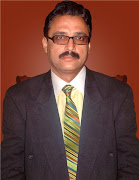KARACHI: Punjab Governor Salmaan Taseer on Friday invited the administration of the Kidney Centre Post Graduate Training Institute, Karachi (KCPGTI) to establish a centre in Lahore and vowed that the Punjab government would facilitate them.
Taseer and his wife Amna toured different parts of the KCPGTI. Taseer lauded the contribution of the KCPGTI, saying that the institute was doing a tremendous job by providing free medical treatment to thousands of poor patients suffering from kidney diseases.
“We should all have the passion to serve humanity,” said Taseer. Speaking to the media he expressed hope that similar institutes will be established in other parts of the country.
“There is a lot of development work taking place in Karachi, and we will learn from some of the projects here so that they can be replicated in Lahore and other parts of Punjab,”said Taseer. “My father-in-law remained at the KCPGTI for a few years and I have heard that he has been treated well here,” he said appreciating the work of the Institute. “You’re doing a great job!”
The KCPGTI is a non-profit specialized hospital that provides complete diagnostic and treatment facilities for kidney related diseases. The institute commenced operations back in 1985 with only a two-machine dialysis set up. According to KCPGTI records, the institute has treated 500,000 patients, out of which 75 percent were treated for free.
“The figure is impressive and shows how well the Kidney Center is doing to serve society,” Taseer added. Earlier, while briefing the Punjab Governor on certain statistics, the Kidney Center Board of Governors chairman said that one out of every four Pakistanis is or will suffer from kidney diseases. According to the chairman, the KCPGTI treats 4,000 patients every year.
Taseer and his wife Amna toured different parts of the KCPGTI. Taseer lauded the contribution of the KCPGTI, saying that the institute was doing a tremendous job by providing free medical treatment to thousands of poor patients suffering from kidney diseases.
“We should all have the passion to serve humanity,” said Taseer. Speaking to the media he expressed hope that similar institutes will be established in other parts of the country.
“There is a lot of development work taking place in Karachi, and we will learn from some of the projects here so that they can be replicated in Lahore and other parts of Punjab,”said Taseer. “My father-in-law remained at the KCPGTI for a few years and I have heard that he has been treated well here,” he said appreciating the work of the Institute. “You’re doing a great job!”
The KCPGTI is a non-profit specialized hospital that provides complete diagnostic and treatment facilities for kidney related diseases. The institute commenced operations back in 1985 with only a two-machine dialysis set up. According to KCPGTI records, the institute has treated 500,000 patients, out of which 75 percent were treated for free.
“The figure is impressive and shows how well the Kidney Center is doing to serve society,” Taseer added. Earlier, while briefing the Punjab Governor on certain statistics, the Kidney Center Board of Governors chairman said that one out of every four Pakistanis is or will suffer from kidney diseases. According to the chairman, the KCPGTI treats 4,000 patients every year.








































